
He signed Rangers' first Catholic player in 118 years and once planted a Galatasaray flag on the turf of their biggest rivals. Writing in The Players' Tribune, Graeme Souness explores what makes a great derby match...
I first learned what a rivalry really was at White Hart Lane.
Well, to be honest, I probably learned it first from the Arsenal fans clinging to the top of the team bus in hopes of sneaking into the ground for the match. How exactly they got on to the top of the bus, or how long they'd been there - for the life of me - I do not know.
What I do know is that I never experienced anything else in my career quite like that day.
I had just arrived to Tottenham in 1968, only 15 years old at the time. For a lot of lads, they grow up going to matches with fathers or mates. Those Saturday or Sundays where you head over to the stadium probably with a scarf on - knowing every word, every clap and every pause to the supporters' chants.
Except, I never actually had that experience. Don't get me wrong, growing up in Edinburgh, I was all too familiar with the Hibs and Hearts rivalry. My father grew up in Leith - Hibee territory - just off of Easter Road on Albert Street. But I'd be playing in the morning for my school team and in the afternoons for the Scottish School Boys league. So until I moved down south I didn't really see that side of the game.
Until I witnessed my first north London derby.
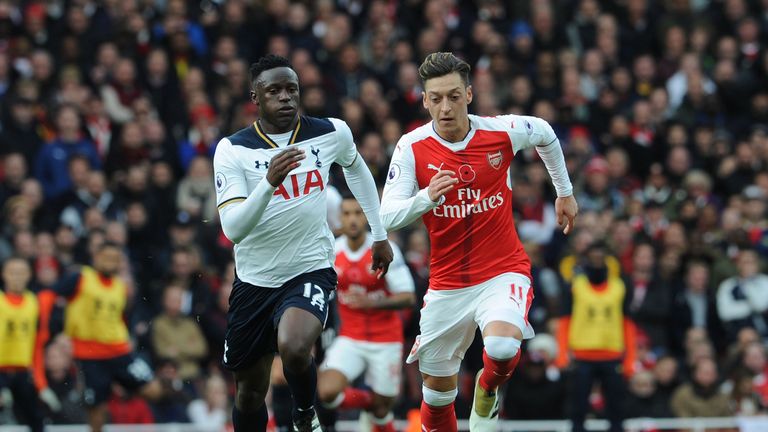
I was just in the youth side at the time, but we'd get tickets through the club - sitting way, way up - to watch the older lads. In those days, I'd walk over to the grounds. I lived only about a mile's walk away. I had done it plenty of times before for training. But that day, as I got closer and closer to White Hart Lane, all I could see were people filling up the roads and lanes around the park. I'll never forget that. Just the amount of people.
I mean, a total mob of supporters from both sides. The north London derby is still enormous today, but things were a little different back then. For one thing, you could show up to the grounds the day of the match and get tickets. But of course, this isn't any regular game. This is the derby. So they reckon about 250,000 people showed up to White Hart Lane, which at the time only held about 50,000.
Two-hundred and fifty thousand. It blew me away. Let me remind you, I had come from a city where that would've been half the population.
It was utter madness.
And then the Arsenal team bus arrived, trying to make its way hopelessly through the main gate as the legs of half a dozen Arsenal supporters dangled from above. Supporters swarming everywhere.
I'll never, ever forget the site of tens of thousands of people, with literally nowhere to go.
Or the results. That's the other thing I learned that sticks with you. You never forget when you beat - or when you lose - to your city rival. And the result that day wasn't too great for us.
Win or loss, that night will always be my first derby day and the night when football changed for me ... in a way.
Every supporter knows what those matches mean - the bragging rights, the scarves and all that. I maybe saw that first hand a little later than the rest, but from that night I knew. I understood.
I just didn't think football rivalries would take me to the forefront of religious and political debates in Scotland, or standing in the middle of a pitch staring down dozens of angry Turks ready to turn me into mince.
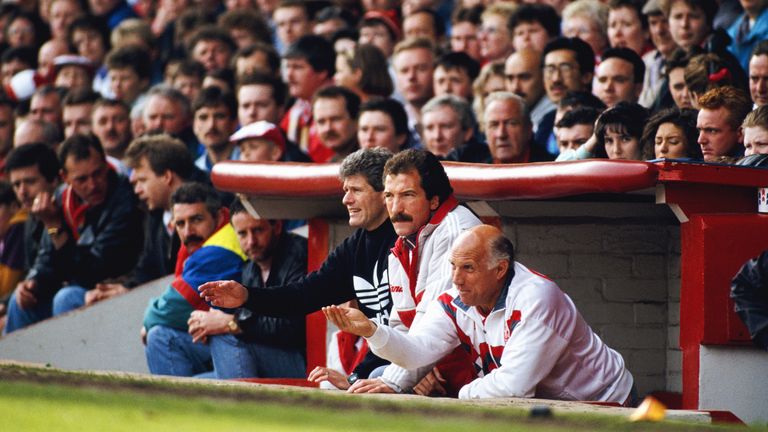
"You will win for us, won't you, Graeme?"
I turned around. My hand still held the nozzle to fill up my car with petrol. I saw an elderly man looking back at me.
"You've got to win this weekend."
This was day-to-day life in Liverpool. Whether filling up my car or going out to buy a newspaper.
"Need that win tomorrow, Graeme!"
When I got to Liverpool in 1978, we were the biggest scalp. We were the team to beat. And I lived in the city when I played for the club, so wherever I went, leading up to a game against Everton, supporters would remind you just how important it was.
It didn't matter that we were the dominant Merseyside team. I can only remember losing to the Toffees once, on an Andy King goal. (Might just be might selective memory). But supporters would come up like everything was on the line that weekend. Because for them - and therefore, for us - it was.
The supporters, they're the ones that live and breathe on that win. Many times if we lost - derby or not - they wouldn't show up to work on the Monday. It was that important.
And as a player, you just feed off of that. Especially in Liverpool, the passion just fuels you all week and right through the 90 minutes on the pitch.
That's how it should be.
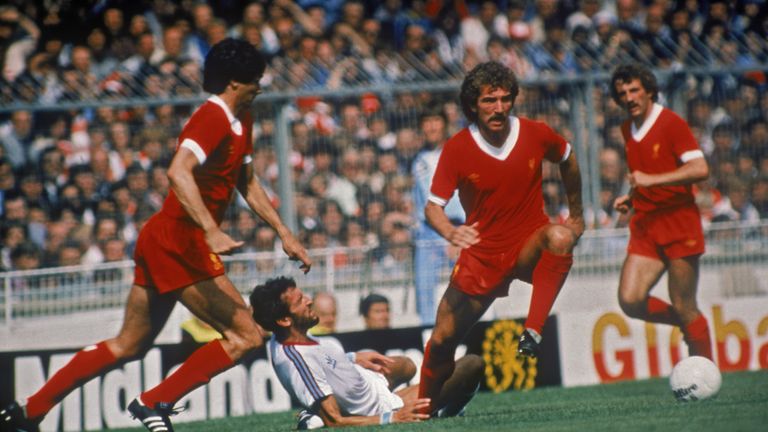
Whenever we'd play at Goodison Park, we'd stay at the same hotel just outside the city. So it was about a 25-minute drive to the ground. And it was always the same: About a mile out, we'd start to slow down in traffic and the supporters - blue and red - would recognise the team bus. We'd, as you expect, get abuse from the blue half, and well wishes from those in red.
No matter the record, though, it was never an easy game for us. No matter the wins, we knew Everton would be 100 per cent switched on.
"This game today might not be the biggest game of your season," the gaffer would tell us, "but the guys across the corridor in that dressing room, it's their biggest game.
"And you have to be bang at it every time you go out and cross that white line."
Of course, it was also known as the Friendly derby back then too. You would see dad and lad walking in together - one in red, one in blue. There were never any problems off the pitch. On the field, we were aggressive. But I remember playing at Anfield and even in the Kop behind the goal and maybe a quarter of that would be blue. Blue! Two clubs, two groups of supporters, sitting side by side.
That would never happen in Glasgow.
"Would you ever sign a Catholic player?"
This question had been asked of every manager on his first day at Rangers FC. If Merseyside is the Friendly Derby, then in the West of Scotland, the Old Firm is anything but. The rivalry between Rangers and Celtic goes far beyond football - it's religion, it's politics, it's both the savoury and unsavoury of the sport.
To be honest, the religious aspect was not something I ever really bought into. I grew up in Edinburgh, and then I was in England, so it was never really a part of my life.
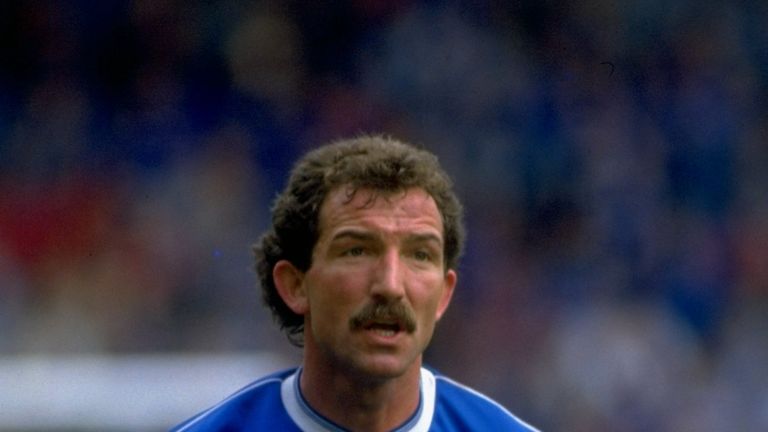
But when I came back to Scotland at 33, I suddenly found myself thrown into the middle of it.
Starting with that question.
For over 100 years, there wasn't really any question to be answered. Jock Stein, the great Celtic manager, once said that if there was a Protestant kid and Catholic kid, the club would only have to concentrate all of its efforts on the Catholic kid, because they already knew the Protestant would play for Rangers. That's just the way it was. No question.
But times were changing, it seemed, everywhere else but Glasgow. And it was time the city caught up.
"Yes," I said. "I would."
And of course, the journalists took a sigh, their eyes rolled up to ceiling.
"Yeah, we've heard this before."
But three years later in 1989, we did do it when we signed Mo Johnston. I know it sounds crazy now in 2017, but he really was the first Catholic signed to the club in 118 years. And all of a sudden, instead of half of Scotland being looked at by Rangers or Celtic, all of them were.
It's something that helped the clubs, helped the rivalry and something that I'm very, very proud of.
For that history, for the grittiness of Glasgow, for the size and following of the two clubs, there is nothing like the Old Firm rivalry. Looking back, it's probably the biggest I've ever been a part of. And while I was responsible for some change in the city, I quickly realised I had a lot to learn as well. When I first arrived, I said I didn't care if we lost to Celtic if we still won the league or the Scottish Cup. That was just my my pragmatic English attitude.
Unacceptable.
I quickly found out that was also just not how things worked in Glasgow. Reason and pragmatism are probably the first two things left at the door at Ibrox and Parkhead. Let me put it this way: I have witnessed an Old Firm game where you will have a doctor, an accountant, a lawyer standing up, ignoring the game completely and just shouting abuse at the opposition supporters. Just non-stop obscenities. And you think, Wait a minute, that guy has been to university, he's obviously intelligent.
And from the working hours of Monday through Friday, I'm sure he was.
But that's what the Old Firm game does to smart, intelligent people. I don't even think passion covers it. Forget being fuelled by emotion. Never in my career, was the fear of losing so high. For those 90 minutes, those supporters are in a different world.
"What are Galatasaray doing hiring a cripple?"
Perhaps the only thing greater than the pride of one's club, is the pride for oneself. And if both of those are called into question in one quick quip, well, that's just begging for retribution.
I had open heart surgery a couple of years before I came to Istanbul to coach Galatasaray in 1995. As such, that was the choice sentiment of one of the vice presidents of our biggest rivals, Fenerbahce.
I won't go into the ins and outs of what happened that season, but I'll just get to the good bit. The retribution, if you will. Which came in the form of Galatasaray winning the Turkish Cup.
Against Fenerbahce.
On Fenerbahce's pitch.
Not long after the final whistle had blown, the stadium more or less emptied out, except for our supporters behind one of the goals. They pass down this giant club flag with bright yellow and red stripes. It is handed over player to player, until it finally gets to me. I take a few waves of this massive flag, and look to hand it back. But as I do, none of the lads are beside. Instead, they've all already made their way to the centre circle to lift the cup.
That's when I look over, and in my eye I catch Fenerbahce's vice president watching from the director's box. The very same one.
I'll show you who's a cripple.
I took off running. With the flag in my hands, I caught up to the lads in the centre circle. It took a few good tries, but I planted the Galatasaray flag right in the middle of the pitch, feeling pretty proud of myself. That feeling shifted immediately as I realised I made a mistake once the few Fenerbahce supporters left in the stadium were now climbing over the fence to come string me up.
So we made a dash for the tunnel. And once we got to the dressing room and I thought, At any moment the director is going to come in here and fire me and I'll be on the first flight home.
Well, the executives did come down, but with tears in their eyes.
"This is one the greatest moments for the club, and for us," the director told me.
I never kissed so many men in my life than after that game.
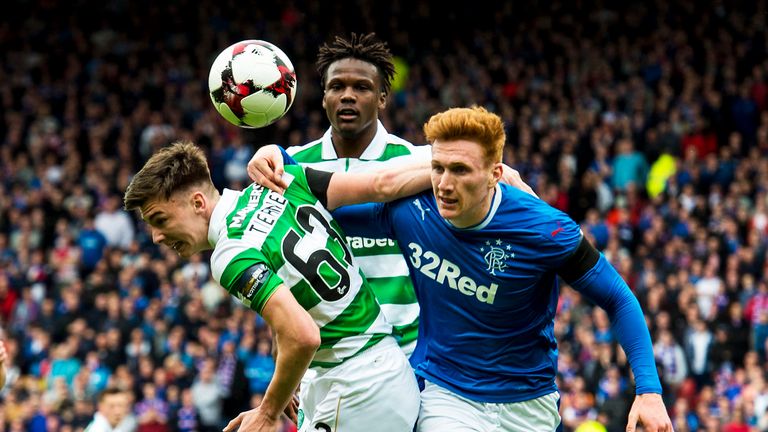
What makes a great rivalry?
I'm asked that question a lot. People think it's the cups, or the success of a club that make the rivalry more intense, more important, just more, I guess.
But, I always say, that part of the argument has to be the passion that the supporters feel for the club. You can't quantify that in a trophy case. I've been lucky to live in some of the most football-mad cities in the world - Liverpool, Glasgow, Istanbul, Lisbon, Newcastle - and see it, be a part of it.
Where football matters, where football becomes a part of the world stage, where football truly is great, is where it means so much to the people.
And that's the passion.
It's a funny thing, passion. That's what makes this sport so special and unique. That all over the world, whether you're a blue-collar worker living in the north of England, or a doctor in Turkey, or a kid walking with his dad in Scotland - for 90 minutes, everyone shares the same exact emotion.
EmoticonEmoticon